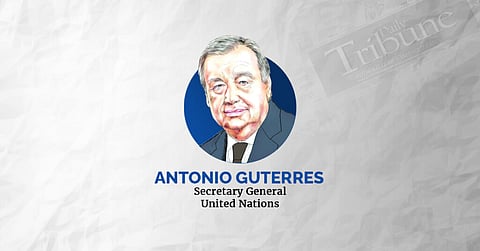
- NEWS
- the EDIT
- COMMENTARY
- BUSINESS
- LIFE
- SHOW
- ACTION
- GLOBAL GOALS
- SNAPS
- DYARYO TIRADA
- MORE

No child should risk death to learn.
Yet this year, as violence against children in armed conflict continues to climb to unprecedented levels, education is once again caught in the crossfire.
The past 12 months saw a staggering 44 percent surge in attacks on schools, resulting in the death, abduction and trauma of thousands of teachers and students. Each violation carries profound consequences — not only for teachers and young learners, but for the future of entire communities and countries.
The United Nations is working tirelessly to stop this scourge, and ensure every child can access their basic right to education, even in the most dangerous contexts. But we cannot do it alone.
Countries must invest in education systems that can reach every child, and fully endorse and implement the Safe Schools Declaration.
I also call on all parties to conflict to meet their obligations under international law, respect schools as places of safety, and hold accountable those responsible for attacks.
The pen, the book, and the classroom are all mightier than the sword.
Let’s keep it that way, and protect the fundamental right of every child to learn in safety and peace.
q q q
Air pollution is a global emergency — and a preventable one.
Today, nearly every person on Earth breathes air that is unsafe, contributing to millions of deaths every year — particularly amongst the elderly and children.
But solutions are within reach. We can rein in the pollutants that choke people, and heat the planet by investing in renewable energy, improving waste management, halting deforestation including wildfires, and promoting eco-friendly agriculture.
Bold policies are key, including stronger enforcement, public alert systems, and collaboration across borders.
Governments must seize the opportunity of new national climate plans — NDCs — due this year, to chart a course to drastic emission cuts, and a just transition away from fossil fuels.
For too many around the world, blue skies have been stained grey by inaction and injustice.
Let us take urgent steps today, for clean, breathable air for all.
q q q
Artificial intelligence and digital technologies are transforming every aspect of our lives — including policing.
On this third International Day of Police Cooperation, we reaffirm that technology must serve the public good.
Digital tools —— including AI —— offer powerful capabilities: enhancing investigations, expanding access to justice, and helping prevent crime and terrorism. Used responsibly, they can strengthen the effectiveness, transparency, and accountability of police institutions around the world.
But modernization must be anchored in values. These tools must be deployed in ways that uphold human rights, mitigate bias, and comply with international law.
In critical decisions, technology must never replace human judgement, nor diminish the role of trained, professional, and ethical police officers committed to those they serve. In the life-altering decisions police make each day, humanity must remain at the core.
Through cooperation, let us harness innovation to rebuild trust, foster community-oriented policing, and shape a future of safety and justice for all.
(UN Secretary-General Antonio Guterres’ messages on the International Day to Protect Education from Attack on 9 September, and on the International Day of Clean Air for Blue Skies and International Day of Police Cooperation on 7 September.)
